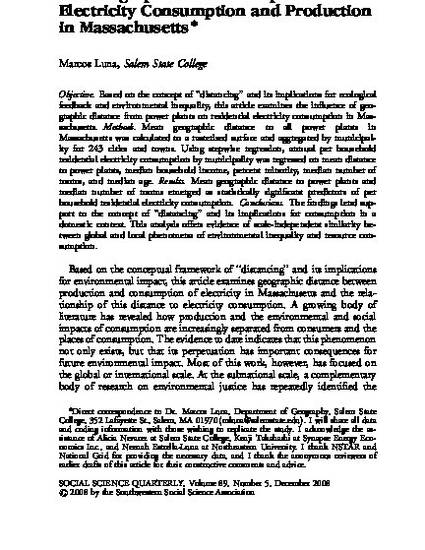
Article
Out of Sight, Out of Mind: Distancing and the Geographic Relationship Between Electricity Consumption and Production in Massachusetts
Social Science Quarterly
(2008)
Abstract
Objective: Based on the concept of ‘‘distancing’’ and its implications for ecological feedback and environmental inequality, this article examines the influence of geographic distance from power plants on residential electricity consumption in Massachusetts.
Methods: Mean geographic distance to all power plants in Massachusetts was calculated to a rasterized surface and aggregated by municipality for 243 cities and towns. Using stepwise regression, annual per household residential electricity consumption by municipality was regressed on mean distance to power plants, median household income, percent minority, median number of rooms, and median age. Results. Mean geographic distance to power plants and median number of rooms emerged as statistically significant predictors of per household residential electricity consumption. Conclusions. The findings lend support to the concept of ‘‘distancing’’ and its implications for consumption in a domestic context. This analysis offers evidence of scale-independent similarity between global and local phenomena of environmental inequality and resource consumption.
Disciplines
Publication Date
December, 2008
Citation Information
Marcos Luna. "Out of Sight, Out of Mind: Distancing and the Geographic Relationship Between Electricity Consumption and Production in Massachusetts" Social Science Quarterly (2008) p. 1277 - 1292 Available at: http://works.bepress.com/marcos-luna/39/
